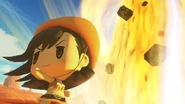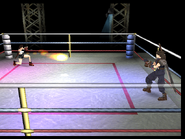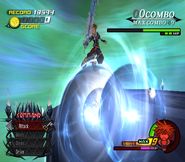
Dissidia 012 Final Fantasy - Tifa's EX Burst
Final Heaven
Final Heaven (ファイナルヘヴン, Fainaru Hevun?), also known as My Final Heaven (俺式ファイナルヘヴン, Ore-shiki Fainaru Hevun?), is a recurring ability in the Final Fantasy series, appearing first in Final Fantasy VII. It is a powerful physical attack, often a Limit Break, and is among the strongest attacks usable by Monks.
Appearances[]
Final Fantasy VII[]
Final Heaven is the final Limit Break for Tifa, requiring the Final Heaven manual acquired from playing the correct tune on the piano in her house in Nibelheim on after Cloud returns in "Clash in the Deep Sea" and while Tifa is in the party. It deals 25⁄8 times normal damage to a single target.
Final Fantasy VII G-Bike[]
Tifa can use Final Heaven as a finisher move to any of Cloud's Limit Breaks.
Final Fantasy VIII[]
My Final Heaven is the final Limit Break for Zell, unveiled after reading the Combat King 005. It requires the player to input ![]()
![]()
![]()
![]()
![]() when it appears. My Final Heaven has a base power of 50 and deals physical damage to all enemies in the battle.
when it appears. My Final Heaven has a base power of 50 and deals physical damage to all enemies in the battle.
Final Fantasy XI[]
Final Heaven is a Hand-to-Hand weapon skill originally only usable by Monks wielding an upgraded pair of Relic Cesti. Another weapon has made the weapon skill available for Puppetmasters wielding a specific weapon as well.
Only through applicable weapons may adventurers use Final Heaven; when a wielder removes the weapon, they lose the ability until they wield it once more. The attack temporarily increases the user's Subtle Blow effect, is affected by the wielder's Vitality, and may induce Light or Fusion Skillchains, being of the Light and Fire elements.
Three weapons that allow their wielder to use Final Heaven are the Caestus, the Spharai, and the Heofon Knuckles. The Caestus only allows its wielder to use Final Heaven while in Dynamis areas, and the Spharai allows a wielder to use Final Heaven anywhere. Both may be wielded only by Monks at level 75. The Heofon Knuckles, meanwhile, may be obtained by upgrading cesti through the Trial of the Magicians, and may be wielded by Monks or Puppetmasters at level 85.
Final Fantasy XIV[]
Final Heaven is a level 3 Limit ability used by the Monk job class. After a long charge time, it delivers an extremely powerful attack to a single target.
Final Fantasy Dimensions[]
Deals holy damage to a single enemy.
Description
Final Heaven is a Fusion Ability unlocked when Holy and Earthshatterer are used. Final Heaven can only be learned by the Warriors of Light. Its damage formula is partially based on the user's ATK.
Dissidia 012 Final Fantasy[]
A flurry of attacks ending in one ferocious tackle.
Menu description
Final Heaven is Tifa's EX Burst attack, attacking the opponent with a powerful explosive punch.
Dissidia Final Fantasy Opera Omnia[]
At least three versions of Final Heaven make an appearance:
- Tifa's version is her BT ability, dealing heavy damage to a single enemy following a flurry of punches.
- Zell's version is a subcommand of his Maximum Duel LD ability, and can only be triggered with actions performed after a Mach Kick. The command reverts to Maximum Duel when My Final Heaven has been performed.
- Yda's version is her BT ability, delivering a magically-charged punch that creates an energy vortex after being empowered by Papalymo.
Theatrhythm Final Fantasy Curtain Call[]
Final Heaven is an exclusive reactive ability that costs 18 to equip. It is activated in Battle Music Sequences (BMS) when a boss-class enemy appears. It deals damage in direct proportion to Strength and Spirit. It is learned by Tifa (level 40) and Tifa #2 (level 40).
Theatrhythm Final Fantasy All-Star Carnival[]
Final Fantasy Airborne Brigade[]
Final Fantasy Record Keeper[]
Final Fantasy Explorers[]
Players can transform into Tifa via the Trance system and use Final Heaven.
Final Fantasy Brave Exvius[]
World of Final Fantasy[]
Final Heaven is Tifa's Champion summon ability. It inflicts neutral physical damage to one enemy and ignores defense. It also grants Strength+ to all allies. It is unlocked after completing chapter 10 and costs 1★ gauge to use. When used "Let the Battles Begin!" from Final Fantasy VII plays.
Non-Final Fantasy guest appearances[]
Ehrgeiz: God Bless the Ring[]
Final Heaven is an ability used by Tifa. This technique can be done by pressing the Special button.
Kingdom Hearts II[]
Tifa uses her final Limit Break attack Final Heaven when fought as a boss, sending a massive energy blast at her opponent.
Other media[]
In the fanmade Dead Fantasy, Tifa kicks Hitomi several times and knocks her down with a Somersault after her Haste state wears off. Tifa then unleashes her Final Heaven to knock Hitomi out.
Gallery[]
Etymology[]
The name likely refers to the concept of seven heavens, the final heaven being reserved for the highest of divine beings. In religious or mythological cosmology, the seven heavens refer to the seven divisions of the Heaven, the abode of immortal beings, or the visible sky, the expanse containing the Sun, Moon and the stars. This concept dates back to ancient Mesopotamian religions and similar concept is also found in some Indian religions such as Hinduism, and in some Abrahamic religions such as Judaism, Islam and Catholicism. The ability originates from Final Fantasy VII, a game with numerous allusions to the number.


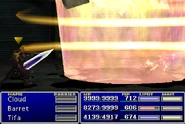
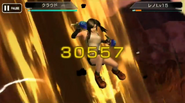

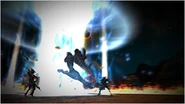
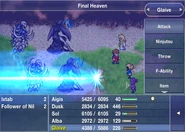

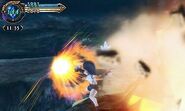
![FFAB Final Heaven - Tifa SSR.png (22 KB) Final Fantasy Airborne Brigade (SSR) [FFVII].](https://static.wikia.nocookie.net/finalfantasy/images/8/87/FFAB_Final_Heaven_-_Tifa_SSR.png/revision/latest/scale-to-width-down/185?cb=20141121072734)
![FFAB My Final Heaven - Zell SSR.png (23 KB) Final Fantasy Airborne Brigade (SSR) [FFVIII].](https://static.wikia.nocookie.net/finalfantasy/images/b/b1/FFAB_My_Final_Heaven_-_Zell_SSR.png/revision/latest/scale-to-width-down/185?cb=20141121072745)
![FFAB Final Heaven - Tifa SSR+.png (22 KB) Final Fantasy Airborne Brigade (SSR+) [FFVII].](https://static.wikia.nocookie.net/finalfantasy/images/a/a3/FFAB_Final_Heaven_-_Tifa_SSR%2B.png/revision/latest/scale-to-width-down/185?cb=20141121075616)
![FFAB My Final Heaven - Zell SSR+.png (23 KB) Final Fantasy Airborne Brigade (SSR+) [FFVIII].](https://static.wikia.nocookie.net/finalfantasy/images/0/04/FFAB_My_Final_Heaven_-_Zell_SSR%2B.png/revision/latest/scale-to-width-down/185?cb=20141121075720)
![FFAB Final Heaven - Tifa UR.png (27 KB) Final Fantasy Airborne Brigade (UR) [FFVII].](https://static.wikia.nocookie.net/finalfantasy/images/6/63/FFAB_Final_Heaven_-_Tifa_UR.png/revision/latest/scale-to-width-down/185?cb=20141120034413)
![FFAB My Final Heaven - Zell UR.png (25 KB) Final Fantasy Airborne Brigade (UR) [FFVIII].](https://static.wikia.nocookie.net/finalfantasy/images/b/bd/FFAB_My_Final_Heaven_-_Zell_UR.png/revision/latest/scale-to-width-down/185?cb=20141124220137)
![FFAB Final Heaven - Tifa CR.png (9 KB) Final Fantasy Airborne Brigade (CR) [FFVII].](https://static.wikia.nocookie.net/finalfantasy/images/6/60/FFAB_Final_Heaven_-_Tifa_CR.png/revision/latest?cb=20150614205214)
![FFAB Final Heaven - Tifa Legend SSR.png (19 KB) Final Fantasy Airborne Brigade (SSR Legend) [FFVII].](https://static.wikia.nocookie.net/finalfantasy/images/7/79/FFAB_Final_Heaven_-_Tifa_Legend_SSR.png/revision/latest/scale-to-width-down/185?cb=20141127091228)
![FFAB Final Heaven - Tifa Legend SSR+.png (20 KB) Final Fantasy Airborne Brigade (SSR+ Legend) [FFVII].](https://static.wikia.nocookie.net/finalfantasy/images/3/34/FFAB_Final_Heaven_-_Tifa_Legend_SSR%2B.png/revision/latest/scale-to-width-down/185?cb=20141127104315)
![FFAB My Final Heaven - Zell Legend UR.png (10 KB) Final Fantasy Airborne Brigade (UR Legend) [FFVIII].](https://static.wikia.nocookie.net/finalfantasy/images/7/7b/FFAB_My_Final_Heaven_-_Zell_Legend_UR.png/revision/latest?cb=20160222010955)
![FFAB Final Heaven Legend UR+.png (38 KB) Final Fantasy Airborne Brigade (UR+ Legend) [FFVII].](https://static.wikia.nocookie.net/finalfantasy/images/5/51/FFAB_Final_Heaven_Legend_UR%2B.png/revision/latest/scale-to-width-down/185?cb=20141022061533)
![FFAB Final Heaven Legend UR+ 2.png (34 KB) Final Fantasy Airborne Brigade (UR+ Legend) [FFVII].](https://static.wikia.nocookie.net/finalfantasy/images/8/8b/FFAB_Final_Heaven_Legend_UR%2B_2.png/revision/latest/scale-to-width-down/185?cb=20141025054205)
![FFAB Final Heaven - Tifa Legend CR.png (8 KB) Final Fantasy Airborne Brigade (CR Legend) [FFVII].](https://static.wikia.nocookie.net/finalfantasy/images/8/8b/FFAB_Final_Heaven_-_Tifa_Legend_CR.png/revision/latest?cb=20150701030825)
![FFBE Final Heaven.png (462 KB) Final Fantasy Brave Exvius [FFVII].](https://static.wikia.nocookie.net/finalfantasy/images/0/07/FFBE_Final_Heaven.png/revision/latest/scale-to-width-down/106?cb=20190117191036)
![FFBE Final Heaven LB.png (258 KB) Final Fantasy Brave Exvius (Limit version) [FFVII].](https://static.wikia.nocookie.net/finalfantasy/images/b/b2/FFBE_Final_Heaven_LB.png/revision/latest/scale-to-width-down/106?cb=20180201045608)
![FFBE My Final Heaven.png (408 KB) Final Fantasy Brave Exvius [FFVIII] (4★).](https://static.wikia.nocookie.net/finalfantasy/images/8/8c/FFBE_My_Final_Heaven.png/revision/latest/scale-to-width-down/107?cb=20180806014501)
![FFBE My Final Heaven 2.png (427 KB) Final Fantasy Brave Exvius [FFVIII] (5★).](https://static.wikia.nocookie.net/finalfantasy/images/4/4d/FFBE_My_Final_Heaven_2.png/revision/latest/scale-to-width-down/105?cb=20180806014500)
![FFBE My Final Heaven 3.png (402 KB) Final Fantasy Brave Exvius [FFVIII] (6★).](https://static.wikia.nocookie.net/finalfantasy/images/0/01/FFBE_My_Final_Heaven_3.png/revision/latest/scale-to-width-down/105?cb=20180806014500)
